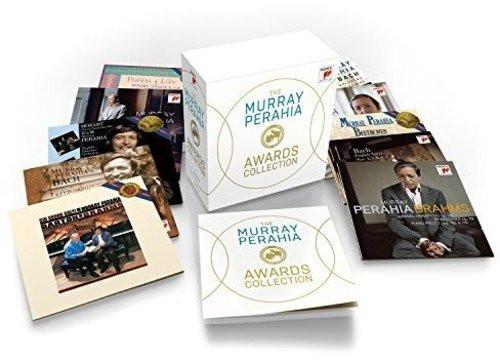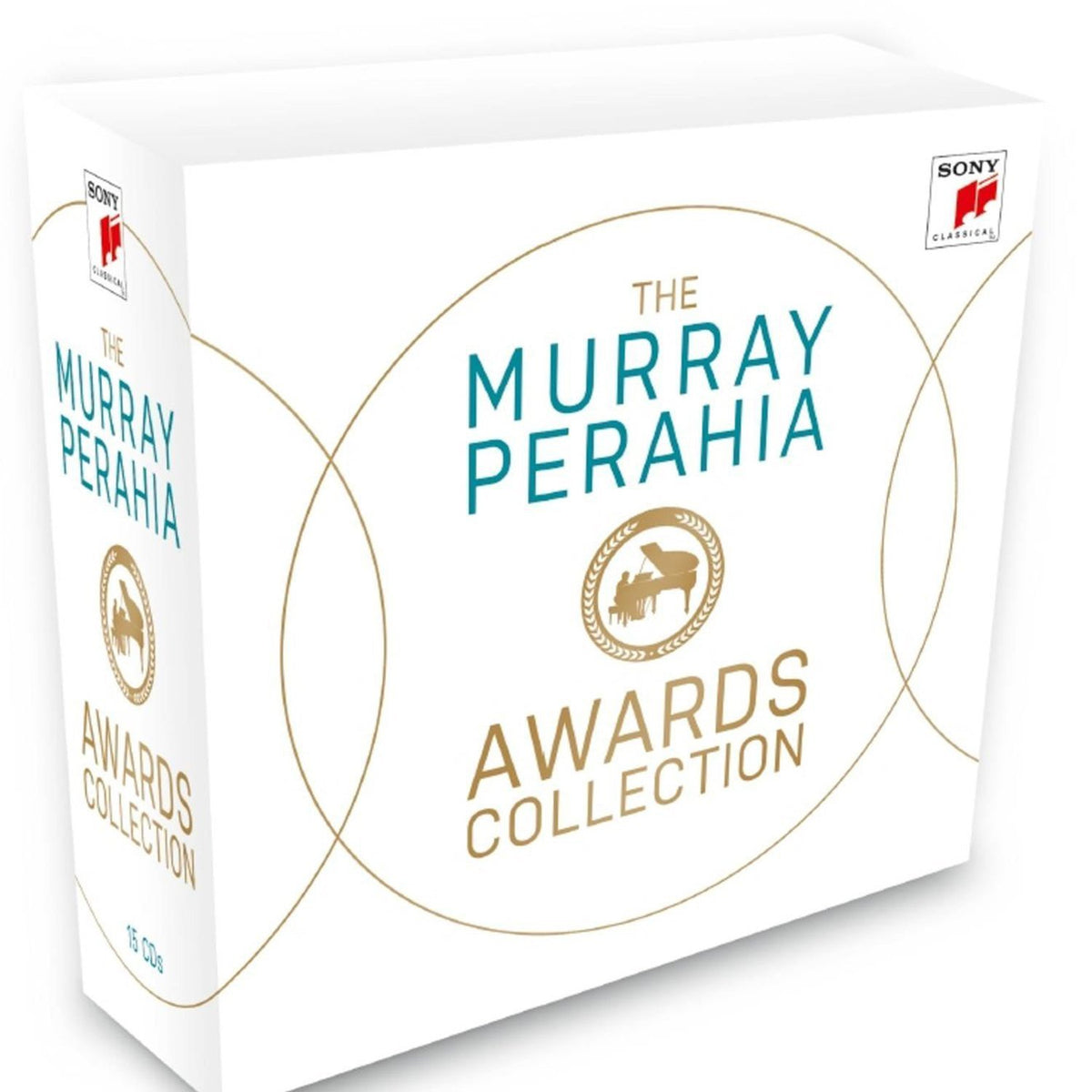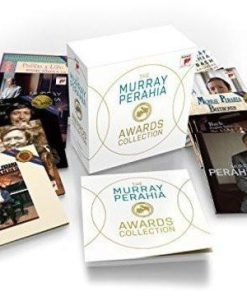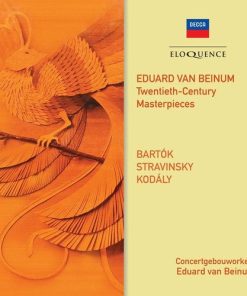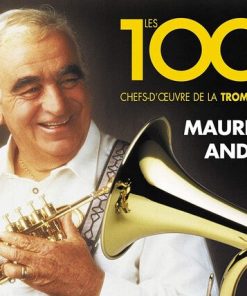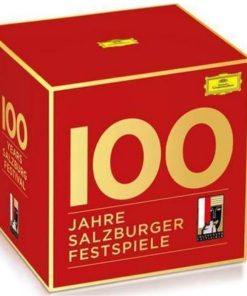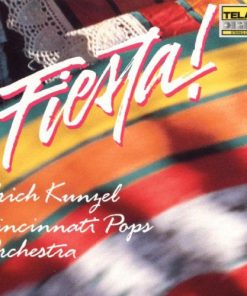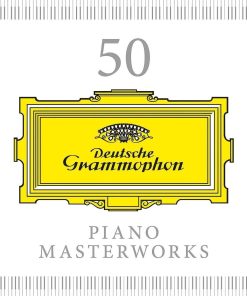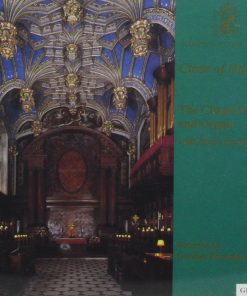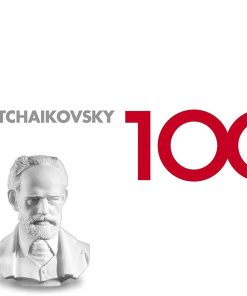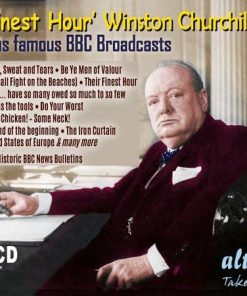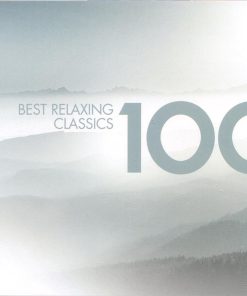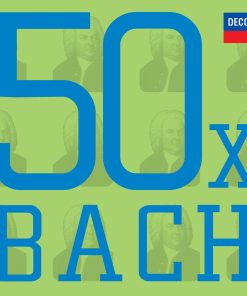MURRAY PERAHIA AWARDS COLLECTION (15 CDS) SONY CLASSICS
$ 59,99 $ 30,00

Murray Perahia’s prolific recording career has spanned some 45 years to date, encompassing music of three different centuries, from Bach to Bartók. Ever since his first LP, soon after his triumph at the 1972 Leeds International Piano Competition, aged 25, the great American pianist’s performances have more than stood the test of time; and along the way they have been recognised with an astonishing crop of awards. The Grammys in the US, the Gramophone Awards in Britain, the Diapason d’or in France and the ECHO Klassik awards in Germany are among the organisations that have picked out many of Perahia’s recordings as some of the finest of their day. This set is devoted to Perahia’s award-winning discs for Sony Classical / CBS Masterworks. These also trace the story of his journey through the musical world, capturing magnificent collaborations, unforgettable partnerships and peerless solo accounts alike. The earliest recording here dates from 1983 and presents Perahia as soloist and director in two exquisite Mozart piano concertos, No. 15 in B-flat major, K 450 and No. 16 in D major, K 451. Much influenced by his studies at the Curtis Institute with the Polish pianist Mieczyslaw Horszowski and by playing chamber music at summer courses such as Marlboro and Blue Hill, Perahia was attracted to the close-knit, chamber music-like qualities of the concertos and sought to bring these to the fore, particularly spotlighting the English Chamber Orchestra’s fine wind soloists. This was named Best Concerto Recording at the Gramophone Awards 1984, and soon afterwards Perahia and the ECO’s complete set of the Mozart concertos was also awarded a Rosette by the Penguin Guide to Compact Discs. Two years later, Perahia joined forces with a close friend and musical kindred spirit: the Romanian pianist Radu Lupu, who shares Perahia’s affinity for the most intimate works among the Viennese classics, including Mozart, Schubert and Brahms. They teamed up for some memorable joint performances, not least at the Snape Maltings, Suffolk, while Perahia was co-artistic director of the Aldeburgh Festival (1981–1989). He and Lupu recorded the Mozart Sonata for Two Pianos, K 448 and the Schubert F minor Fantasy for Piano Duet, D 940 live at Snape; it became an instant classic, winning Best Instrumental Recording at the Gramophone Awards in 1986. It was around the same time, having explored the Mozart concertos to happy effect, that Perahia was turning his attention in the studio to those by Beethoven, in a cherished collaboration with the conductor Bernard Haitink and his Royal Concertgebouw Orchestra from Amsterdam. Their recording of the Piano Concertos No. 3 and 4 scooped a Gramophone Award in 1986 (Best Concerto Recording). Beethoven has been central to Perahia’s repertoire for his whole career and in recent years he has been preparing a new edition of the piano sonatas for Henle Urtext. If Haitink has been a close colleague for Perahia over many years, so was Sir Georg Solti. “He was a formidable musician,” Perahia said of him in an interview a few years ago with the present writer. “He once played for me a Haydn oratorio as if it was a piano piece, reading from the score or memorised, as if it were the most natural thing in the world. I have only happy memories of him.” The fiery Hungarian conductor was also a magnificent pianist – and in this role he recorded with Perahia one of the most thrilling accounts yet set down of the Bartók Sonata for Two Pianos and Percussion, together with the percussionists David Corkhill and Evelyn Glennie. Again the Snape Maltings was the venue and the joyous result was recognised with the 1989 Grammy for Best Chamber Music Performance. By this time Perahia had built a reputation second to none for his interpretations of the German-Austrian classics. Yet at the Leeds International Piano Competition he had triumphed by playing the Chopin Piano Concerto No. 1 in the final. Chopin might have seemed to take a back seat to Beethoven and Mozart as Perahia’s career progressed, but his recording of the Four Ballades and a selection of mazurkas, waltzes, études and nocturnes proved a revelation to many, winning him the Gramophone Award for Best Instrumental Recording in 1995. Eight years later, his account of the Études opp. 10 and 25 was recognised with a Grammy for Best Instrumental Soloist Performance. Perahia has cited the Chopin Études as a vital practice tool, remarking in the aforementioned interview, “I’m occupied with ideas of legato touch and smoothness of line,” and suggesting that work on these studies can be of vital benefit in achieving those qualities. When Perahia chose to record a disc of Handel Suites and Scarlatti Sonatas, the result was showered with accolades, winning Record of the Year at the 1997 Midem Cannes Classical Awards and the Best Instrumental Solo or Chamber Performance – 17th / 18th Centuries. It was also given the 1997 Gramophone Award for Best Instrumental Recording. The link between Handel and the Romantic era came to the fore when Perahia recorded Brahms’s grand-scale Variations on a Theme of Handel, along with the two Rhapsodies op. 79 and the late Klavierstücke opp. 118 and 119. The critic for Gramophone declared: “Time and again Brahms’s potential for strenuousness and opacity is clarified with a superfine musical intelligence and technique … I doubt whether the concluding and exultant fugue has often been given with a more formidable yet lightly worn articulacy in its entire history.” No surprise, then, that this recording won a Gramophone Award and an ECHO Klassik in 2011. But if Perahia’s Handel and Scarlatti recording was ultimately a fascinating, beautifully executed excursion, Bach has been a stronger presence – and has also brought him more awards than any other single composer. His Bach recordings include the Brandenburg Concerto No. 5 and the Concerto for Flute, Violin and Keyboard BWV 1044 – most unusual on the modern piano – as well as the Keyboard Concertos, which pair him with the Academy of St Martin in the Fields, of which he became principal guest conductor in 2000. The concerto discs won ECHO Klassik awards in 2002 and 2003. In the Bach solo keyboard music, Perahia’s accounts of the English Suites were honoured with an ECHO Klassik 1999 and Nos. 1, 3 and 6 with a Grammy; the Goldberg Variations won the Gramophone Award for Best Instrumental Recording 2001 and an ECHO Klassik; and the second disc of his Six Partitas won an ECHO Klassik in 2008, with both CDs scooping the Diapason d’or in 2008 and 2009 respectively. In 2013, London’s Royal Academy of Music, of which Perahia is an honorary fellow, presented him with its Bach Prize. Playing Bach has had a profound impact on Perahia’s approach to composers such as Beethoven and Chopin, whose music, he reflects, would have been “unthinkable” without it. “It’s so joyful, so full of buoyancy and spirituality, that it affects all of the music written after it,” he says.

Bach, J S:
English Suite No. 1 in A major, BWV806
English Suite No. 3 in G minor, BWV808
English Suite No. 6 in D minor, BWV811
Goldberg Variations, BWV988
Keyboard Concertos Nos. 1-7 BWV1052-1058
Concerto for Flute, Violin & Harpsichord in A minor, BWV1044
Brandenburg Concerto No. 5 in D major, BWV1050
Italian Concerto, BWV971
Partitas Nos. 1-6, BWV825-830
Bartók:
Sonata for Two Pianos & Percussion, BB 115, Sz. 110
Beethoven:
Piano Concerto No. 3 in C minor, Op. 37
Piano Concerto No. 4 in G major, Op. 58
Brahms:
Variations on a theme by Haydn for two pianos, Op. 56b ‘St Anthony Variations’
Variations and Fugue on a Theme by Handel, Op. 24
Rhapsodies (2), Op. 79
Chopin:
Ballades Nos. 1-4
Mazurka No. 2 in C sharp minor, Op. 6 No. 2
Mazurka No. 3 in E major, Op. 6 No. 3
Mazurka No. 4 in E flat minor, Op. 6 No. 4
Waltz No. 1 in E flat major ‘Grande Valse Brillante’, Op. 18
Waltz No. 5 in A flat major, Op. 42
Waltz No. 7 in C sharp minor, Op. 64 No. 2
Étude Op. 10 No. 3 in E major ‘Tristesse’
Étude Op. 10 No. 4 in C sharp minor
Nocturne No. 4 in F major, Op. 15 No. 1
Preludes (24), Op. 28
Handel:
Keyboard Suite, HWV 435 (Chaconne) in G major
Keyboard Suite, HWV 427 in F major
Keyboard Suite, HWV 428 in D minor
Keyboard Suite, HWV 430 in E major ‘The Harmonious Blacksmith’
Mozart:
Piano Concerto No. 15 in B flat major, K450
Piano Concerto No. 16 in D major, K451
Piano Concerto No. 23 in A major, K488
Scarlatti, D:
Keyboard Sonata K27 in B minor
Keyboard Sonata K29 in D major
Keyboard Sonata K105 in G major
Keyboard Sonata K206 in E major
Keyboard Sonata K212 in A major
Keyboard Sonata K247 in C sharp minor
Keyboard Sonata K491 in D major
Keyboard Sonata K537 in A major
Schubert:
Fantasie in F minor for piano duet, D940
and Brahms piano works
Fast Shipping and Professional Packing
Due to our longstanding partnership with UPS FedEx DHL and other leading international carriers, we are able to provide a range of shipping options. Our warehouse staff are highly trained to pack your goods exactly according to the specifications that we supply. Your goods will undergo a thorough examination and will be safely packaged prior to being sent out. Everyday we deliver hundreds of packages to our customers from all over the world. This is an indication of our dedication to being the largest online retailer worldwide. Warehouses and distribution centers can be located in Europe as well as the USA.
Orders with more than 1 item are assigned processing periods for each item.
Before shipment, all ordered products will be thoroughly inspected. Today, most orders will be shipped within 48 hours. The estimated delivery time is between 3-7 days.
Returns
The stock is constantly changing. It's not entirely managed by us since we are involved with multiple parties such as the factory and our storage. The actual stock can fluctuate at any time. Please understand it may happen that your order will be out of stock when the order is placed.
Our policy is valid for 30 days. If you haven't received your product within 30 days, we're not able to issue either a return or exchange.
You are able to return a product if it is unused and in the same condition when you received it. It must also still remain in the original packaging.
